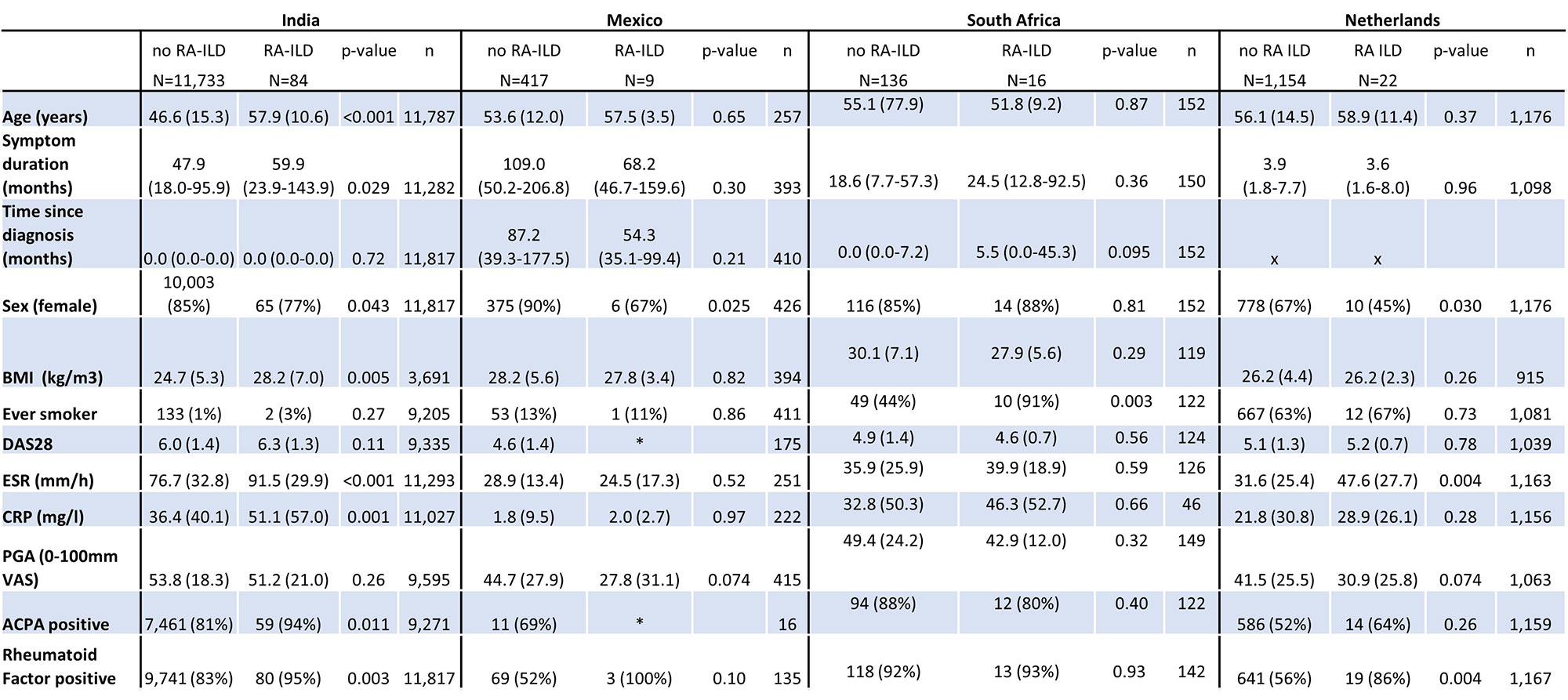Session Information
Session Type: Poster Session A
Session Time: 1:00PM-3:00PM
Background/Purpose: Interstitial lung disease (ILD) is a spectrum of inflammatory and fibrotic lung diseases, and can be associated with RA (RA-ILD). The reported prevalence in previous studies ranges from 1.8 to 58 percent, depending on the definition and diagnostics. Our aim is to investigate the incidence and prevalence of RA-ILD in different countries worldwide.
Methods: Patients of four countries from two observational databases were studied. Patients from India, Mexico and South Africa with a physician-based RA diagnosis were selected from the observational METEOR database. From the Leiden EAC (Early Arthritis Clinic) in the Netherlands, patients with early RA as classified by the 1987 ACR and/or 2010 ACR/EULAR criteria were included. Additional data on RA-ILD diagnoses was collected retrospectively. An ILD diagnosis was regarded valid based on chest X-ray or CT. X-ray was performed at the first outpatient visit in India, South Africa and the Netherlands and on clinical indication in all countries.
Prevalence and incidence rate (from date of RA diagnosis) were calculated for each country. In the Netherlands date of inclusion in the EAC was a proxy for date of diagnosis. Patient characteristics were described, comparing patients with and without ILD using appropriate statistical tests.
Results: Within the four countries 13,571 patients with RA, both newly diagnosed and with longer RA disease duration, were evaluated. Prevalence and incidence of RA-ILD differed per country. The prevalence of RA-ILD at the end of follow-up was 0.7% (84/11,733) in India (mean (SD) follow-up 12 (20) months), 2.1% (9/426) in Mexico (mean (SD) follow-up 17 (27) months), 1.9% (22/1,176) in the Netherlands (mean (SD) follow-up 77 (72) months) and 10.5% (16/152) in South Africa (mean (SD) follow-up 47 (26) months). In Mexico and South Africa, all patients had a CT based RA-ILD diagnosis. In the Netherlands, only in one patient no chest CT was done. In India chest CTs were performed less often: the RA-ILD prevalence was 0.5% (61 patients) when only regarding CT based diagnoses.
The incidence rate (IR) of RA-ILD in India was 1.4 (95% CI 1.1 to 2.6) per 1000 person years. In Mexico the IR was 1.5 (95% CI 0.7 to 3.1) per 1000 person years. In the Netherlands the IR was 2.7 (95% CI 1.7 to 4.2) per 1000 person years. In South Africa the IR was 16.4 (95% CI 9.5 to 28.3) per 1000 person years.
Patient characteristics are described in Table 1. In India patients with RA-ILD were older, had a higher BMI and were more often ACPA positive than patients without RA-ILD. In 3 of 4 countries RA-ILD patients were more often male. Higher inflammatory markers and more RF positivity were seen in RA-ILD patients in India and the Netherlands. In South Africa, patients with RA-ILD more often had a history of smoking.
Conclusion: Prevalence and incidence of RA-ILD varied between the four countries with the highest prevalence and incidence in South Africa. These differences might be partially explained by differences in diagnostic approaches, and potentially in patient populations, used therapies and background morbidity, although the available patient characteristics do not provide an immediate explanation. Follow-up data and data from other countries will be included to further study RA-ILD worldwide.
Data are presented as mean (SD), median (IQR), n (%), where appropriate. *Insufficient data available
To cite this abstract in AMA style:
Heckert S, Maarseveen T, Marges E, Chopra A, Vega Morales D, Du Toit R, van der Helm-van Mil A, Huizinga T, Allaart C, Bergstra S. Rheumatoid Arthritis Associated Interstitial Lung Disease Across Continents [abstract]. Arthritis Rheumatol. 2022; 74 (suppl 9). https://acrabstracts.org/abstract/rheumatoid-arthritis-associated-interstitial-lung-disease-across-continents/. Accessed .« Back to ACR Convergence 2022
ACR Meeting Abstracts - https://acrabstracts.org/abstract/rheumatoid-arthritis-associated-interstitial-lung-disease-across-continents/

